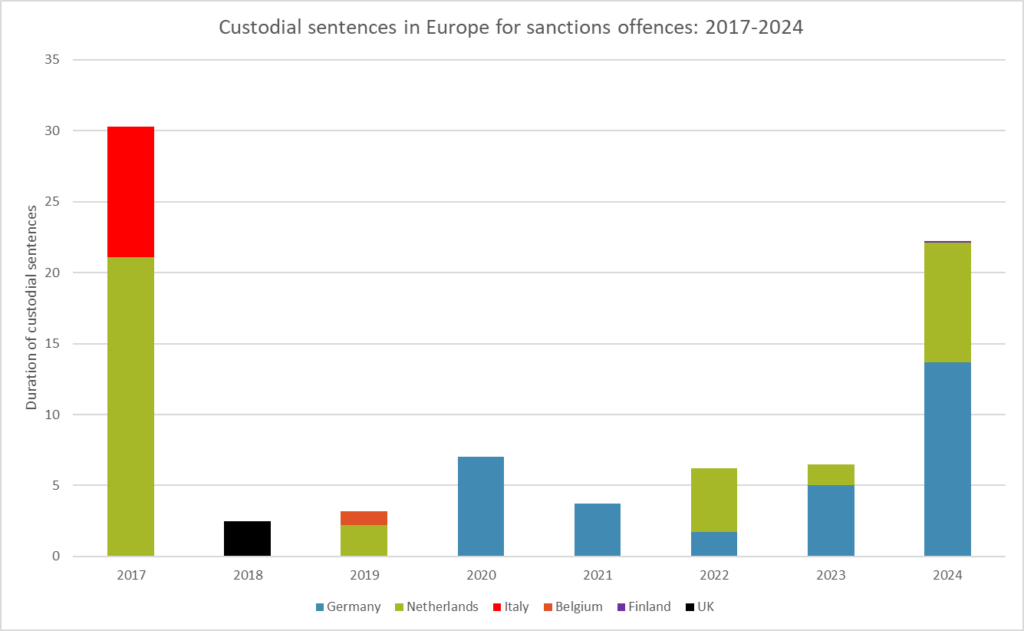The figures are, naturally, based on publicly-available information as collated in this blog.
The figures are not always easy to reconcile into a coherent picture. For example:
- The Netherlands has the most convictions, but none of the longest sentences;
- Germany has far fewer convictions than the Netherlands, but all of the longest sentences;
- Finland has a massive number of ongoing investigations but has only imposed fines to date of €11,080;
- Switzerland has 15 convictions, but no custodial sentences and €58,435 in fines;
- Poland has the highest number of successfully-concluded enforcement actions under the Russian sanctions but has no criminal convictions; and
- The UK dominates the figures on total fines, but has a low number of criminal convictions.
Most criminal convictions since 2017:
- Netherlands – 40
- Switzerland – 15
- Germany – 10
- Latvia – 7
Fewest criminal convictions since 2017:
- Austria, Bulgaria, Croatia, Cyprus, Estonia, France, Greece, Hungary, Ireland, Lithuania, Luxembourg, Malta, Moldova, Poland, Portugal, Romania, Slovakia, Slovenia, Spain, Sweden – 0
- Czechia and Norway – 1
- Denmark, Italy and United Kingdom – 3
Most Russian/Belarusian sanctions convictions/fines/penalties since 2017:
- Poland – 24
- Netherlands – 21
- Switzerland – 15
- Latvia – 11
Fewest Russian/Belarusian sanctions convictions/fines/penalties since 2017:*
- Belgium, Bulgaria, Croatia, Cyprus, Denmark, France, Greece, Hungary, Ireland, Luxembourg, Malta, Moldova, Portugal, Slovakia, Slovenia, Spain, Sweden – 0
- Czechia, Italy, Norway, Romania – 1
- Finland – 4
- United Kingdom and Lithuania – 7
* The Estonia figure is uncertain based on this story, but how high/low is uncertain.
Most currently-ongoing investigations:*
- Finland – 800
- Latvia – 310
- United Kingdom – 307
- Netherlands – 192
* Germany probably belongs on this list. It has commenced at least 1988 investigations since February 2022, but many of the States that responded to Freedom of Information Requests did not provide data on ongoing investigations, but only the total number of investigations commenced since the start of the full-scale war.
Longest custodial sentences since 2017 (where the sanctions element can be distinguished):*
- Germany – 7 years (2020)
- Germany – 6 years and 9 months (2024)
- Germany – 5 years (2023)
- Germany – 3 years and 9 months (2021)
* The list excludes convictions where there are also non-sanctions offences and where the sentence cannot be divided, such as the 19-year sentence imposed in the Netherlands which included war crimes offences.
Most extraditions to the United States to face US sanctions charges
- Latvia – 4
- Cyprus, Estonia, Spain, United Kingdom – 2
- Croatia, Germany, Greece, Italy, Romania – 1
- All other European countries are at zero.
Highest total value of fines/confiscations/penalties (in Euros) since 2017:
- United Kingdom – €268,344,548 (of which the FCA’s fines make up €228,465,751)
- France – €50,600,000
- Germany – €26,112,903
- Lithuania – €23,513,079
Lowest total value of fines/confiscations/penalties (in Euros) since 2017 where value is known:*
- Bulgaria, Croatia, Cyprus, Greece, Hungary, Ireland, Moldova, Portugal, Slovakia, Slovenia, Spain and Sweden – €0
- Norway – €4260**
- Finland – €11,080
- Switzerland – €58,435
- Czechia – €143,500
* Malta has imposed a fine of unknown size but greater than €800, and Austria has imposed at least 10 fines of unknown value.
** This is an underestimate for Norway as it has concluded 23 confiscations of goods where no value was published.
Highest single fines/confiscations/penalties within 2024
- UK – £29m by the FCA
- Lithuania – €13.6m by Customs
- Lithuania – €8.23m by the Financial Crimes Investigation Service
- Poland – €2.78m by Customs
Most successfully-concluded enforcements within 2024
- Poland – 22
- Netherlands – 10
- Lithuania – 7
- Switzerland – 6
- UK – 5*
- Germany – 4
- Luxembourg – 3
- Estonia – 2**
- Finland – 2
- Latvia – 2
- Czechia – 1
- Malta – 1
- All other European countries are at zero.
* The UK figure excludes export control enforcements unrelated to sanctions.
** The Estonia figure is likely to be higher based on this story, but how much higher is uncertain.

